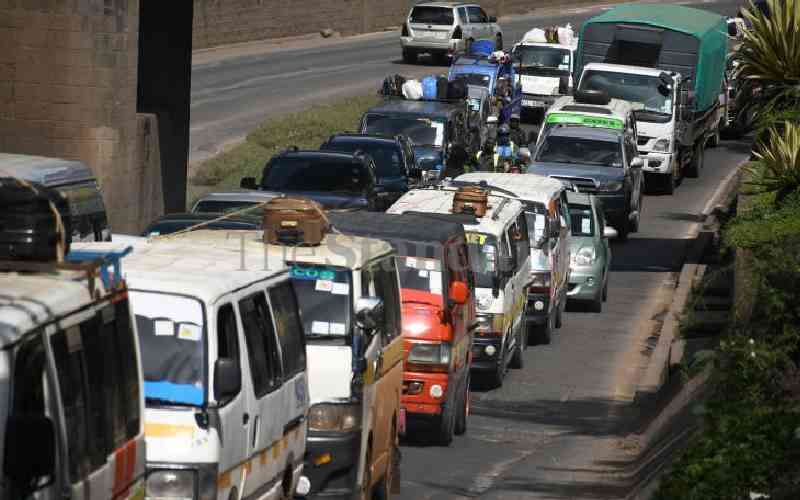
NAIROBI, KENYA: The discovery of oil in Turkana County is expected to bring significant developments to a hitherto neglected region, as well as dramatically impact the country’s economy. But as the county races to deliver its first barrel of oil, major challenges have been encountered. Tullow Kenya Social Performance Manager Rob Gerrits spoke to Business Beat on these emerging issues and how the company is tackling them.
Turkana South residents have complained of a number of grievances against Tullow sub-contractors, including harassment, unauthorised deduction of their pay and arbitrary sackings. What’s your response?
Tullow works with multiple contractors who provide a range of goods and services. Ardan is one such contractor, providing civil works, transport and accommodation services. We are aware that, the previous week, Ardan addressed several employment-related grievances raised by a number of their employees at the Twiga 1 site.
Tullow was present in these discussions and our understanding is that these were resolved satisfactorily. Tullow is committed to policies that ensure a fair, transparent and equitable employment system across all our operations and include such requirements in all contractual documents.
When Tullow started the oil project in Kenya, it promised local communities social investments in sectors like education, healthcare, infrastructure and security. How much has been done in Turkana South?
Our unprecedented exploration success in Kenya in the South Lokichar Basin has been accompanied by substantial social investments that have had a positive impact for communities across the county.
In 2013, the company initiated the Turkana Education Programme, which supports needy students through bursaries and provision of textbooks. Through this programme, Tullow has invested Sh24 million, which has benefitted more than 3,000 students.
The Turkana Secondary School Scholarship Project (SSSP), which is run in partnership with the Diocese of Lodwar, provides funds and mentorship to students from the county to help them complete their secondary education.
The Tullow Group Scholarship Scheme has seen seven students from Turkana get the opportunity to pursue postgraduate qualifications in fields related to oil and gas.
This year, Tullow has committed to invest nearly Sh400 million, almost double the Sh233 million spent in 2013, in social projects targeting areas that communities in Turkana have identified as essential to sustainable development, especially in the areas of access to water and education.
Specifically in Turkana South sub-county, this year, Tullow’s SSSP has benefitted 10 bright students. Through the Turkana Education Programme, we have disbursed Sh5 million for a one-off bursary that has benefitted 406 beneficiaries.
The firm has commissioned the Komusia community water project in Kalapata area at a cost of Sh16 million, and continues to support additional community water projects in Kalapata, Kokito and Kangakimak areas.
We are constructing a sub-county hospital facility in Lokichar at a cost of Sh24 million. The project is currently at the design stage.
Rehabilitation of the Nakwamoru irrigation scheme and development of the Kalapata irrigation project will cost Sh40 million.
Stay informed. Subscribe to our newsletter
School infrastructure projects – a dormitory at Uhuru High School and Kainuk Secondary School, a science laboratory in Katilu Girls and a dining hall in Kaputir Girls — will cost Sh15 million.
Local investors have accused Tullow of skewing the tendering processes to favour foreign companies even in areas where local firms can provide services. Your comments?
Our strategy is to ensure, wherever possible, goods and services are sourced locally, creating new jobs and supporting the local business community and economy. We expect our contractors and sub-contractors to comply with our specific tendering procedures, which prioritise local supply, and to that end, we monitor our contractors’ expenditure on a monthly basis.
Our contractors locally source nearly all food and camp supplies, rental vehicles, security personnel as well as construction materials. In the second quarter of this year, for example, they spent over Sh330 million in procuring such goods and services from Turkana.
In instances where contractors are unable to source for such requirements locally, Tullow is investing in several initiatives to build capacity and increase competitiveness to further increase the ability of local providers to meet industry standards.
When will the first barrel of oil come from Turkana, and what resource-sharing formula will apply?
The Government of Kenya has set an ambitious target of delivering the first oil in 2017. We are aligning our development schedule towards meeting this target.
Substantial challenges must be overcome to achieve this target, including further exploration success, a clear legal and policy environment, as well as substantial investments in infrastructure.
Oil production-derived revenue will only be available after successful development of infrastructure and commencement of operations. In general — and across the world — revenue-sharing models are typically defined in legislation and are generally not within the remit of private sector oil and gas operators.
However, it is important to note that Kenya is already deriving a benefit from the oil and gas sector, even before the first barrel is out of the ground. In 2013, businesses across the country made Sh8.2 billion in revenues from supplying services to Tullow Kenya and its contractors. Further, Tullow paid Sh1.9 billion in taxes to the Government and its activities have created over 3,000 jobs, the vast majority taken up by Turkana residents.
Few Kenyans have expertise in geology and exploration science. Any plans to train them in these fields?
We are committed to promoting education and local skills development through several initiatives. The Tullow Group Scholarship Scheme provides opportunities for local university graduates to pursue postgraduate qualifications in oil and gas-related programmes.
The company is in discussion with the Government on ways to develop the country’s human resource base and has recently assisted personnel from three universities attend a curriculum development seminar in London where they got to learn about the industry’s needs from oil professionals and tertiary institutions.
However, the important thing is not the ultimate number of oil and gas graduates, since there are limited opportunities within the sector. Most of the jobs will be in the industries that service it, including construction, transport, hospitality, security and communications.
Tullow is investing in several programmes that aim to build capacity among local small and medium-sized companies and entrepreneurs to enable them take advantage of the opportunities afforded by the growth of the oil and gas industry. These businesses will be the driving force for absorbing the workforce being trained in Kenyan universities.
[email protected]
 The Standard Group Plc is a
multi-media organization with investments in media platforms spanning newspaper
print operations, television, radio broadcasting, digital and online services. The
Standard Group is recognized as a leading multi-media house in Kenya with a key
influence in matters of national and international interest.
The Standard Group Plc is a
multi-media organization with investments in media platforms spanning newspaper
print operations, television, radio broadcasting, digital and online services. The
Standard Group is recognized as a leading multi-media house in Kenya with a key
influence in matters of national and international interest.
 The Standard Group Plc is a
multi-media organization with investments in media platforms spanning newspaper
print operations, television, radio broadcasting, digital and online services. The
Standard Group is recognized as a leading multi-media house in Kenya with a key
influence in matters of national and international interest.
The Standard Group Plc is a
multi-media organization with investments in media platforms spanning newspaper
print operations, television, radio broadcasting, digital and online services. The
Standard Group is recognized as a leading multi-media house in Kenya with a key
influence in matters of national and international interest.






